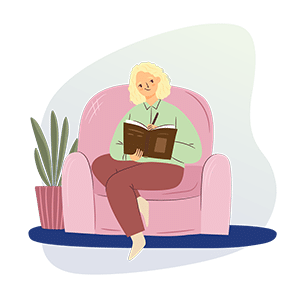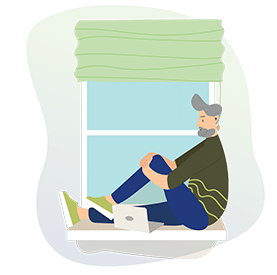Embracing Self-Care: Essential Practices for Trauma-Informed Healing
Embracing Self-Care: Essential Practices for Trauma-Informed Healing
As we dive into trauma-informed care this month at the National Center, we’re highlighting the importance of self-care in navigating and healing from past experiences. While self-care is vital for everyone, it can be an especially useful practice for those who have experienced trauma.
At the National Center, we’re working to improve access to mental health services for children and families who have experienced the child welfare system. Self-care is an important piece of the mental health picture, and it can look different for everyone. We reached out to representatives from various groups in the mental health and child welfare systems to learn what self-care looks like for them.
Youth and young adults in child welfare
Victor Sim is a Lived Experience Leader with FosterClub, a National Center partner. As a guest on the Family Voices United podcast, he spoke about practicing self-care during a crisis.

Victor recalls taking time for his mental health as a child in foster care. “I used to be really good at ‘slow down time’… I would listen to music in the morning and at night to slow myself down.”
When asked about the advice he gives to others, he reminds listeners that, “It’s okay to know you’re not okay.”
Mental health workers
When we talk about mental health, it’s important to remember practitioners are people, too. They experience the effects of daily stressors and traumas like the rest of us. In fact, the demand for mental health services has increased dramatically since 2020. In a 2022 survey, 46% of mental health workers reported not being able to meet the demands of their increased workloads. Nearly half of the practitioners surveyed reported feeling burned out in 2022.

“Some of my favorite ways to practice self-care as a therapist are physical exercise, yoga, or anything that can get my body moving.”
Aside from exercise, Regi also gleans energy from art and community. “Listening to music, walking with my dog, and spending quality time with family and friends are the main ways I like to recharge, as well as getting a massage every now and then.”
Child Welfare Professionals
Similar to mental health workers, increased workloads, rising demands, and burnout are all too familiar to child welfare professionals. Erin Bader, Director of Knowledge and Dissemination at the National Center and former child welfare worker takes self-care seriously as she balances her life and passion for her work.

It can be tough to find a balance between work and life, but Erin knows the importance of taking time to rest and unwind. “Work-life balance is a practice/way of life for me and allows me time to recharge my batteries so I can show up as my best self at work. This work matters too much for me not to be on my A-game. I also think that as helpers, it’s important for us to seek help too–therapy, journaling, support from loved ones.”
Families/Caregivers

Arnie Eby, foster and adoptive parent and Executive Director of the National Foster Parent Association (NFPA), a National Center partner organization, likes to take a moment each morning to look out the window and center his energy on something outside.
“Focus time,” is Arnie’s way of tuning out the noise in life and grounding himself in the present moment.
While these are all great examples of personal wellness, self-care is not one-size-fits-all, and it can look different for everyone. The important thing is to find out what works for you! How do you practice self-care?
For more information on trauma-informed care, check out some of these resources in our Knowledge Hub:
Understanding Trauma-Informed Care to Build Parent Resilience
Trauma Informed Parenting-Sequential Engagement
Lived Experience (LEx) Leadership: Critical to Being Trauma Informed
